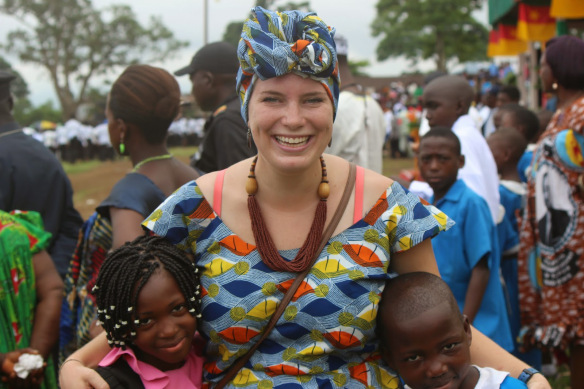The 5 Biggest Myths About The Peace Corps

A few weeks ago, I was sitting in my living room in Cameroon, speaking on the phone with a potential partner who works in an office in Cape Town, South Africa. “Sorry, it’s hard to hear you,” she said, as we discussed implementing her program, which combines soccer drills with malaria education. “The connection’s bad and…is that a rooster in the background?” Indeed it was.
It was a rooster that, as I was sitting on my couch reading a few days later, snuck inside to pay me a visit. Ever since moving to a midsize Cameroonian town as the Peace Corps Volunteer, this rooster has become a major player in my life.
You might think you know all about the Peace Corps—a bunch of idealist hippies committing two years of their lives to living like locals in a mud hut in a remote African village. Maybe, like Ursula on Friends, they help build homes. Or maybe, like Brian on Family Guy, they teach everyone American pop songs and end up marrying the village chief’s daughter. Of course, the reality is that there are as many experiences to be had in the Peace Corps as there are Peace Corps Volunteers (PCVs).
A few months ago, I traveled to Washington, D.C. for a weeklong blogging conference at Peace Corps headquarters.
A few months ago, I traveled to Washington, D.C. for a weeklong blogging conference at Peace Corps headquarters. There, I had the privilege to meet PCVs from all over the world, from Albania to Thailand to Senegal.
Although there was a lot that we could all commiserate about together—it seemed like every one of us had grown accustomed to traveling in the big vans rigged to fit more passengers that are ubiquitous in the developing world—our experiences varied more widely than I could have predicted.
“We’re not all in Africa,” lamented one PCV, tired of feeling like her Peace Corps experience was any less valid because it didn’t fit the cookie cutter experience created by pop culture references. Here are five more things popular culture would lead you to think you’ll do in the Peace Corps (that you probably won’t):
The 5 Biggest Myths About The Peace Corps
1. You’ll spend each morning drawing water from a well and every night reading by candlelight.
I fall somewhere towards the middle of the spectrum of PCV living conditions. On one end, there’s the en brousse experience or, in the bush; and on the other, there’s the “posh corps” experience. I have (fairly reliable) electricity; my water runs from a tap for an hour each morning, starting at 6:30; and I have good cell phone coverage, but I live on a dirt road and must travel by moto-bike to reach a paved one.
But every experience is different. There are PCVs with Wi-Fi in their houses and PCVs who have to travel hours on dirt roads before reaching a town with a cell tower. There are PCVs in national capitals and PCVs who cannot find vegetables in their villages.
2. You’ll meet only bleeding heart, save-the-world-types.
The Peace Corps attracts all types of people. Here in Cameroon, I know young environmental science majors who build tree nurseries. I know middle-aged Southerners who give classes about better business practices, environmentalists who research and spread the word about the harmful effects of the bush meat trade.
I also know former bankers who work at microfinance institutions, former biology majors who teach calculus, registered nurses who work in orphanages, dancers from Long Island who work on eco-tourism initiatives, former basketball coaches who teach English, South Dakotans who help farmers raise rabbits, former accountants who coach youth baseball…the list goes on.
3. You’ll be “queened.”
Some of my friends here live in small communities where they are beloved by all. Some PCVs have village nicknames that mean something along the lines of “woman who holds up the sky.” I’ve also heard of “man who is capable of all.” Some people are made chiefs or queens. Me? Not exactly.
The other day, I was invited to a meeting at the town council. The mayor and village chief were going to be in attendance, and the budget was going to be discussed. I felt like such a big shot, being invited to talk shop with all the most important elected officials.
Once I arrived, I asked where my seat was. I was eyeing the stage that had been set up for the “big men.” The work partner who had invited me put a hand on my shoulder. “Go downstairs,” he instructed me.
“White privilege” is real. But, I am by no means instantly the most important person when I walk in a room; hierarchy and respect for elders take precedent where I live.
4. You’ll go crazy partying in the capital.
I remember hearing before I left that when PCVs reunite in the capital city of their country. They descend on the downtown bars and clubs to get all the partying out of their systems before returning to the bush. As it turns out, people in my town can party harder than anyone I’ve ever met in my life.
No decent event—a funeral, a Women’s Day parade, a public library’s grand opening—is even worth attending if it isn’t well stocked with crates of 33 beers. Or, jerry cans of palm wine.
When we’re in Yaoundé, the capital city of Cameroon, we might seize the opportunity to seek out mediocre pizza, but I’m usually in bed by 9 pm (which I affectionately call “village midnight”).
5. You’ll save the world.
As a Peace Corps Volunteer, I have judged speech and debate competitions. I’ve dug compost pits with sixth graders, and talked to carpenters about balancing their budget.
Additionally, I’ve held focus groups with new parents about gender norms. Those activities have been rewarding. But, they don’t stand out nearly as much in my memory as the endless afternoons with my friend, Alice.
We met at her roadside boutique, eating so many sugar-coated peanuts that I fear diabetic shock. We found ourselves sewing ugly pink pillows as an impatient and incompetent student of my favorite tailor. Or, drinking one too many beers with “Pa,” the man who sells me, among other things, my toilet paper, and laughing as he tells me the story of the dissolution of his first marriage and his subsequent move here.
I was told before I arrived in Cameroon that I would learn much more than I could ever teach in my two years in the Peace Corps. It turns out that that one is no myth; it’s the straight-up truth.
The 5 Biggest Myths About The Peace Corps
Related Reading
The Peace Corps and Beyond: A Conversation with Kelly Branyik
What’s it Like to Be a Peace Corps Volunteer?
Joining the Peace Corps and Pursing My Master’s in Moldova
Peace Corps in Jordan: Exchanging Control for Understanding
Have you volunteers in the Peace Corps? What were your impressions? Email us at editor@pinkpangea.com for information about sharing your experience and advice with the Pink Pangea community. We can’t wait to hear from you.
The 5 Biggest Myths About The Peace Corps photo credits: unsplash and Anna Nathanson









